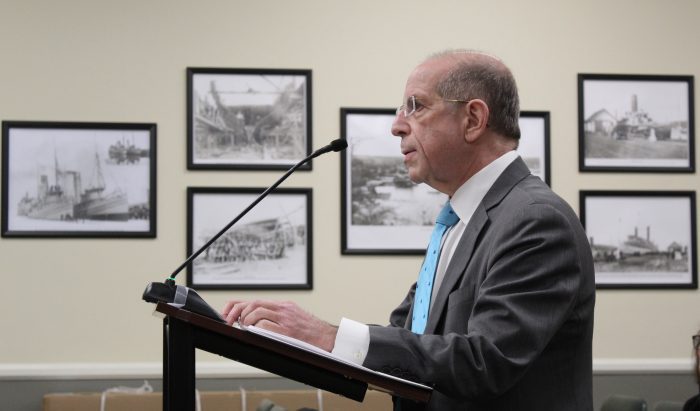Port Jeff village board, residents mull over ethics code revamp

Discussions centered around ethics at Village Hall Monday night, Nov. 20.
The Port Jefferson Board of Trustees held a public hearing to consider repealing and replacing Chapter 41 of the Village Code, its Code of Ethics. This ethics code was first adopted by the village board in 1970, according to ecode360, and has seen few amendments since.
Steven Leventhal, the village’s ethics counsel, delivered a lengthy presentation detailing the proposed code changes to the board.
“The primary purpose of the ethics program is not enforcement — it’s not rooting out evildoers,” he said. “Our primary goal is offering guidance to the honest officers and employees of the village.”
Leventhal said that the draft proposal before the board is roughly the same code of ethics adopted by various other municipalities across Long Island and New York state, with some minor local variations.
The proposed code includes three principal categories: a code of conduct, disclosure requirements and administration.
The code of conduct would establish standards for officials and employees, offering guidelines for using public office for private gain, types of prohibited contracts, grounds for recusal, conflicts of interest and investments, gifts and favors.
The section on disclosure requirements outlined how village officials must recuse themselves from particular decisions. Applicants in land use, such as before the zoning and planning boards or Building Department, “must disclose at the time of application the identity of any state or municipal officer or employee that has an interest in the applicant,” the ethics counsel noted.
The section also requires disclosure of clients and customers doing business with the village, with some exceptions to protect confidentiality.
The final section would establish a board of ethics to administer the new code. Leventhal said an effective ethics board must convene at least quarterly, maintaining independence from the appointing authority — namely, the Board of Trustees — and an apolitical nature.
Under the proposed code, ethics board members must be village residents appointed to fixed, staggered terms of service. Under the current language, the board would have enforcement powers to fine up to $10,000 for violations.
During the public comment period, resident Arthur Epp scrutinized the $10,000 figure and questioned the board membership process. He asked the Board of Trustees for a 30-day review period to allow for necessary public input.
Responding, Leventhal advised the village board against overdefining membership criteria to the ethics board, given the village’s relatively low population compared to other municipalities.
Resident Xena Ugrinsky inquired about the process for whistleblowers to submit complaints to the ethics board. Leventhal advised that the board would ideally have counsel or a secretary to receive and process such complaints.
Following these comments, the village board agreed to leave the public comment period open for written testimony to the village clerk until Thursday, Dec. 7.
To read the complete draft of the proposed guidelines, visit portjeff.com/proposedethicscode. To watch the entire meeting, including trustee reports and board resolutions, see the video above.






